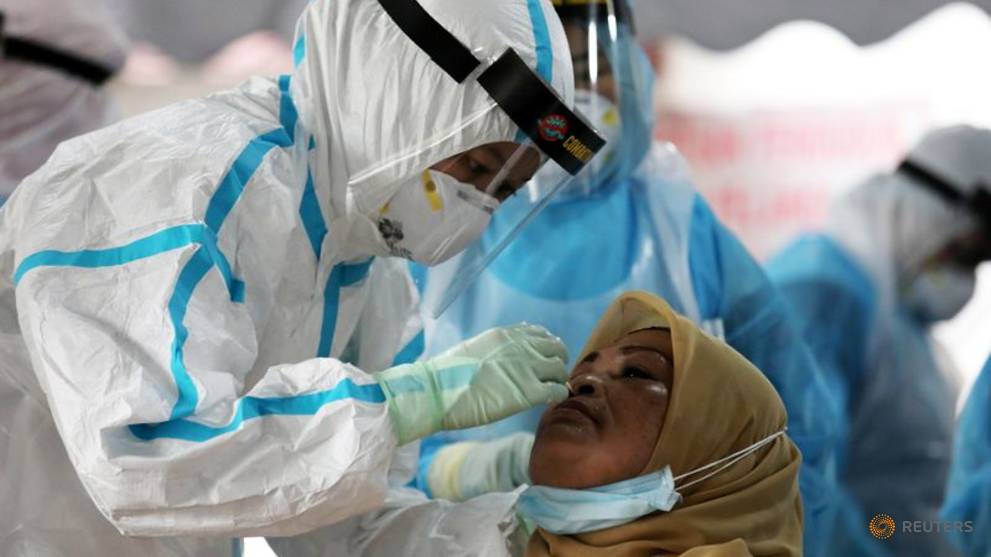BANGKOK: Thousands of demonstrators marched on Thailand's police headquarters in downtown Bangkok on Wednesday (Nov 18) for a second day of protests, after six people were shot during violent clashes.
The kingdom has been rocked by months of protests demanding changes to the constitution, the removal of Prime Minister Prayut Chan-o-cha - and even changes to the untouchable monarchy.
Protesters - numbering more than 10,000 according to an AFP estimate - packed the Ratchaprasong intersection in the heart of Bangkok's shopping and commercial district, after their leaders vowed to step up the movement.
After daubing anti-royal slogans on walls and the ground they marched on the heavily-defended national police headquarters - led by a clown and a parade of giant inflatable rubber ducks.
They were accompanied by a Buddhist monk giving the three-fingered salute borrowed from the Hunger Games movies that has become emblematic of the youth-led protest movement.
Some protesters threw glass bottles and paint bombs over the walls of police headquarters, which was barricaded with dumper trucks, concrete blocks and razor wire, while others used water pistols to hurl paint inside the compound.
READ: Thai police fire tear gas, water cannon at parliament protest
Many had come equipped with with helmets, goggles and gas masks to protect themselves against police action.
"We will protect our people. We don't want any violence but there will be no compromise until they meet our demands," protester Jay, 26, told AFP.
Wednesday's protest came a day after the most violent confrontations since the protest movement began in July, as police used tear gas and irritant-laced water cannon on protesters trying to reach parliament, and activists clashed with royalists.
More than 50 people were injured, six of them with gunshot wounds, according to medical officials, though it is not clear who was responsible for the shooting.
"KEEP FIGHTING"
Prime Minister Prayut has urged protesters to refrain from violence, but ruled out introducing another emergency decree - like the one banning public gatherings of more than four people which spanned a week in October.
But there is little sign the demonstrators are prepared to back down.
"We should not be afraid - this is just a transitional moment in our history," Sirapop Poompuengpoot, another student leader, told the crowd Wednesday.
"People are working for us in parliament and the rest is up to us: Keep fighting."
Tuesday's drama saw protesters plough through police barricades towards parliament to put pressure on MPs debating constitutional reform, prompting the use of tear gas and water cannon.
Police say they did not fire either live rounds or rubber bullets on Tuesday, and they are investigating who was behind the shootings of six people, which happened about 300m from the main protest zone near parliament.
The Thai Human Rights Lawyers Association slammed police tactics, saying they were "not in accordance with international procedure to disperse demonstrations".
CHALLENGE TO MONARCHY
The movement has seen calls from some for reform to the monarchy, and on Wednesday protesters sprayed hundreds of anti-royal slogans, some of them obscene.
Such scenes were until recently unthinkable in a country where the king and his family are protected by some of the world's toughest royal defamation laws.
In photos: Thai protesters, police clash outside parliament
"Tonight is our first victory. A victory for freedom of speech. We can speak about everything, and write anything, even about our king," protester Luke, 29, told AFP.
"I am really happy. I did not think this will happen in my country."
King Maha Vajiralongkorn sits at the apex of Thai power, supported by the military and the kingdom's billionaire clans, and the royal family enjoys support from mostly older conservatives.
Lawmakers have this week been discussing various proposals for constitutional change, which mostly exclude any reform to the monarchy.
On Wednesday they agreed to look at two proposals for a "constitutional drafting assembly", while rejecting more far-reaching Bills to revise the role of the royals and change the makeup of the senate.
https://news.google.com/__i/rss/rd/articles/CBMibWh0dHBzOi8vd3d3LmNoYW5uZWxuZXdzYXNpYS5jb20vbmV3cy9hc2lhL3RoYWlsYW5kLXByb3Rlc3RzLWluanVyZWQtcGFybGlhbWVudC10ZWFyLWdhcy13YXRlci1jYW5ub24tMTM1ODM3MzTSAQA?oc=5
2020-11-18 14:15:00Z
52781187645601


